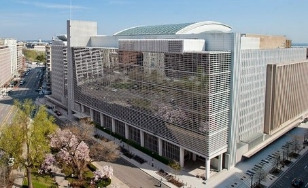
The World Bank Vice President for Western and Central Africa, Ousmane Diagana, says the continent has strong digital growth potential, but conscious and steady efforts have to be made to accelerate progress and build out digital identity systems, especially in the Western and Central African region where developments are lagging.
Diagana contends that for a robust digital infrastructure to be in place in the region and for more people to be able to secure a digital identity, three key things have to be done.
Although not to be done in a day or two, the World Bank writes in an opinion piece published on the Banks’s website, efforts must be stepped up to close the existing and wide digital divide, and to build what he terms “digital stacks,” and then work toward achieving a single digital market.
This, Diagana says, can be done with “greater leadership and collaboration from Governments, the Private Sector and Civil Society” across the continent.
Driving digital growth in the Western and Central Africa region will not only help reverse some of the socio-economic inequalities exposed by the advent of COVID, which significantly sped up digital adoption, it will also attract investments necessary for strong, resilient, green economic growth and quality job creation, writes Diagana.
On the aspect of the digital divide, Diagana mentions that work has to be done to break down the barriers facing the poor or those with limited access to the internet, low or poor mobile network coverage, high operating costs, barriers to market entry, lack of competition, and high operating and investment risks.
This he says must be checked because it adversely affects rural populations, women and vulnerable groups, thereby preventing them from accessing digital services.
Added to the issue of digital divide, Diagana notes, is the need for government regulation so as to smoothen the path to digital transformation in the region.
“We must also support the design and implementation of policies and regulations that de-risk and promote private investment in digital infrastructure. These two levers will help address the issues of affordability and make connectivity productive,” writes the official whose organization is putting $433 million into Nigeria’s biometric identity program in part to increase digital inclusion.
“Digital stacks” can be built by countries expanding their digital identity ecosystems, and making them inclusive and trusted. This will go a long way in solving the problem of the estimated 500 million people in Africa who lack an official ID, and because of that, find it difficult having access too key digital services.
Thirdly, Diagana suggests the need for regional and even continental collaboration digital growth pursuits among countries of Western and Central Africa:
“While continuing to drive digitalization efforts at the national level, West African countries must look beyond their own borders. I believe that success in the digital economy requires economies of scale and network effects far beyond what any individual country can muster on its own.”
He also urges the countries to look forward to a single digital market by supporting each other in building and modernizing their digital infrastructure, policies, as well as regulatory frameworks.
The World Bank has been supporting different programs and projects aimed at accelerating digital transformation in Africa. For instance, it is helping countries build and develop their digital identity ecosystems through its Identification for Development (ID4D) initiative.
Article: World Bank official proposes digital identity steps to drive inclusion in West, Central Africa
